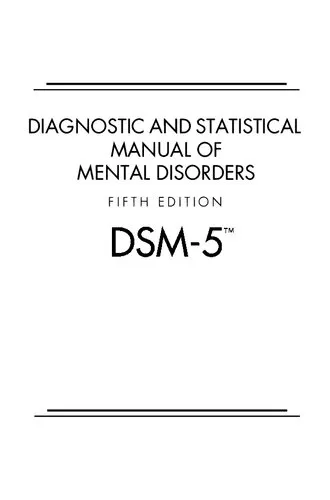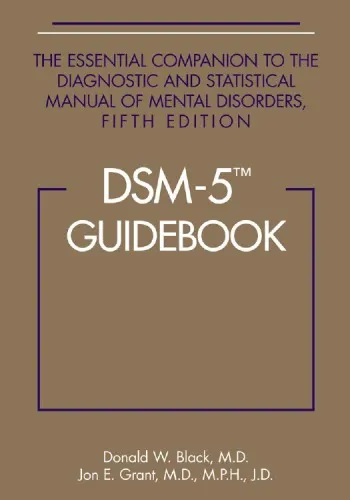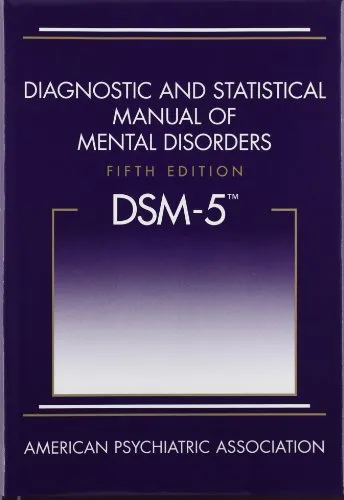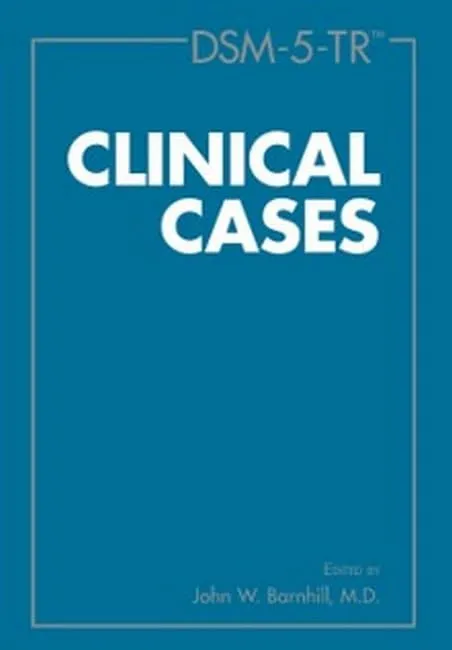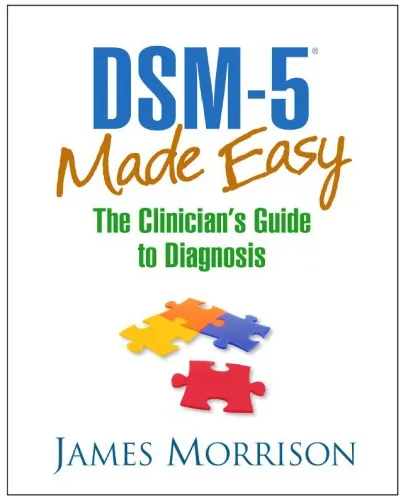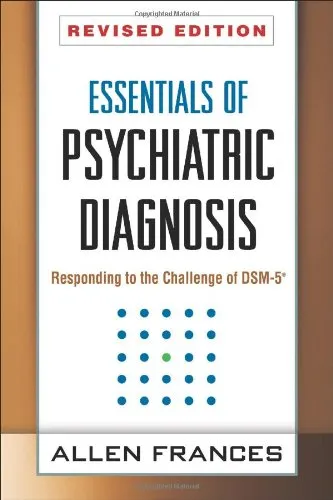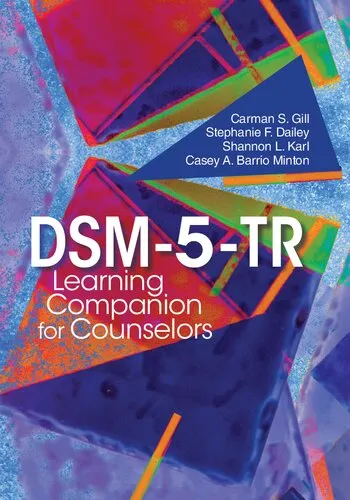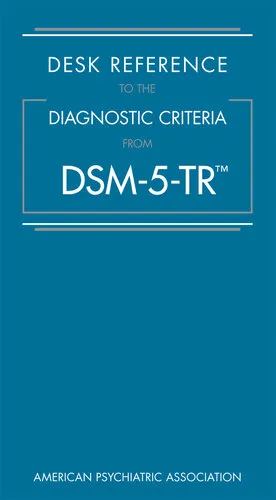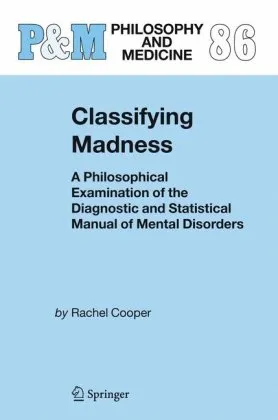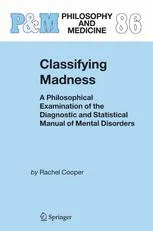Diagnostic and Statistical Manual of Mental Disorders, Fifth Edition (DSM-5)
4.4
بر اساس نظر کاربران

شما میتونید سوالاتتون در باره کتاب رو از هوش مصنوعیش بعد از ورود بپرسید
هر دانلود یا پرسش از هوش مصنوعی 2 امتیاز لازم دارد، برای بدست آوردن امتیاز رایگان، به صفحه ی راهنمای امتیازات سر بزنید و یک سری کار ارزشمند انجام بدینکتاب های مرتبط:
مقدمهای بر کتاب DSM-5
کتاب Diagnostic and Statistical Manual of Mental Disorders, Fifth Edition (DSM-5) یکی از منابع اصلی و معتبر در زمینه تشخیص و طبقهبندی اختلالات روانی است که توسط American Psychiatric Association تهیه شده است.
خلاصه تفصیلی کتاب
DSM-5 کتابی جامع و پیچیده است که به تشخیص اختلالات روانی و روانشناختی میپردازد. این کتاب بهصورت سیستماتیک به دستهبندی، تشریح و معیارهای تشخیصی انواع اختلالات اعصاب و روان میپردازد که توسط متخصصان این حوزه بهکار میرود. DSM-5 بهروزرسانی شده است تا با پیشرفتهای علمی و پژوهشی معاصر همخوانی داشته باشد و ابزار مفیدی برای جامعه پزشکی و روانشناسی محسوب میشود. این کتاب به تحلیل علائم، عوامل مؤثر و راهبردهای درمانی برای هر یک از اختلالات میپردازد و ابزاری ضروری برای تشخیص و برنامهریزی درمانی است.
نکات کلیدی
- نخستین تغییرات و بهروزرسانیها از زمان انتشار DSM-IV-TR.
- تعاریف روشنتر و جامعتر از انواع اختلالات.
- اضافه شدن مفاهیمی نوین در علم روانپزشکی مانند اختلالات عصبی-رشدی و اختلالات مرتبط به مواد.
- تمرکز بیشتر بر دیدگاههای فرهنگی و اجتماعی در تشخیص و درمان.
نقل قولهای معروف از کتاب
“تشخیص صحیح، همراه با مداخله درمانی مناسب، میتواند بهطور شگفتآوری زندگی بیماران را بهبود ببخشد.”
“درک عمیقتر از اختلالات روانی، مسیر پیشرفت به سوی درمانهای موثرتر را هموار میکند.”
چرا این کتاب اهمیت دارد
DSM-5 نهتنها بهعنوان یک مرجع پزشکی و علمی شناخته میشود، بلکه نقشی کلیدی در بهبود سلامت روان عمومی ایفا میکند. آگاهی از اختلالات روانی و معضلات مربوط به آنها میتواند درک بیشتری نسبت به نیازهای بهداشت روانی و اجتماعی افراد فراهم کرده و کمک کند تا با تبعیضها و باورهای غلط در این حوزه مقابله شود.
این کتاب علاوه بر اینکه به متخصصان کمک میکند تا مشکلات روانی را به درستی تشخیص دهند و مناسبترین روشهای درمانی را انتخاب کنند، به ایجاد فهمی جامعتر از سلامت روان در جامعه نیز کمک میکند. اهمیت DSM-5 در این است که بهطور مداوم بهروزرسانی و بر اساس نظر های تخصصی مورد بازبینی قرار میگیرد تا به جلوگیری از خطاهای تشخیصی کمک کند.
Introduction to Diagnostic and Statistical Manual of Mental Disorders, Fifth Edition (DSM-5)
The "Diagnostic and Statistical Manual of Mental Disorders, Fifth Edition (DSM-5)" is an authoritative classification and diagnostic tool published by the American Psychiatric Association. It is widely utilized by clinicians, researchers, psychiatric drug regulation agencies, health insurance companies, pharmaceutical companies, and policymakers worldwide.
Detailed Summary of the Book
The DSM-5 is an expansive and comprehensive manual that provides a standardized classification for diagnosing mental disorders. Released in May 2013, this fifth edition represents a significant advancement from its predecessors, incorporating new insights, research, and a modern understanding of mental illnesses. The DSM-5 is structured to provide clear criteria for each psychiatric diagnosis, accompanied by detailed descriptions and a focus on developmental and life-span considerations.
The manual is divided into three main sections. The first section provides the basic organization and use of the manual. It offers essential guidance on the application of diagnostic criteria and general guidelines for the clinical assessment of patients. The second section comprises the bulk of the manual, listing specific diagnostic criteria for each disorder. This section categorizes disorders based on various factors, including neurodevelopmental, schizophrenia spectrum, bipolar disorders, depressive disorders, anxiety disorders, and more. The third section includes assessments and other measurement tools, cultural formulations, alternative model structures for disorders, and conditions for further study.
Key Takeaways
- The DSM-5 enhances diagnostic accuracy by offering more specific and comprehensive criteria.
- It introduces changes such as the recognition of autism spectrum disorder, replacing Asperger's disorder, and the reclassification of PTSD and OCD into their own categories.
- The DSM-5 emphasizes a dimensional approach to diagnosis, acknowledging the continuum of mental health and illness.
- This edition addresses cultural variations and influences on diagnosis and treatment, integrating cultural concepts throughout the manual.
- Section III of the DSM-5 provides tools to assess symptom severity and functional impairment, assisting clinicians in treatment planning and outcome evaluation.
Famous Quotes from the Book
"The strength of the DSM system lies in its consistency and firm grounding in scientific research."
"In the DSM-5, our aim was to create an informed diagnostic tool that reflects our current understanding of mental disorders as complex and interwoven medical conditions affecting both brain and behavior."
Why This Book Matters
The DSM-5's importance cannot be overstated. It serves as a critical reference for clinical practice and research in mental health, shaping the ways in which disorders are understood and treated. As mental health professionals rely on it for diagnosis, treatment planning, and communication, the DSM-5 also influences education, policy development, and reimbursement processes within healthcare systems. Additionally, it contributes significantly to the destigmatization of mental health conditions by broadening awareness and understanding of psychiatric disorders.
Furthermore, the DSM-5's updates reflect an evolving comprehension of mental health, consistently incorporating the latest research findings into practical applications. This ensures that the manual remains relevant and accurate, aligning clinical practice with contemporary scientific knowledge.
By fostering a greater understanding of mental health disorders while remaining accessible to a broad array of disciplines, the DSM-5 continues to be a vital instrument in promoting mental health awareness, guiding the effective treatment of psychiatric conditions, and ultimately improving patient outcomes globally.
دانلود رایگان مستقیم
شما میتونید سوالاتتون در باره کتاب رو از هوش مصنوعیش بعد از ورود بپرسید
دسترسی به کتابها از طریق پلتفرمهای قانونی و کتابخانههای عمومی نه تنها از حقوق نویسندگان و ناشران حمایت میکند، بلکه به پایداری فرهنگ کتابخوانی نیز کمک میرساند. پیش از دانلود، لحظهای به بررسی این گزینهها فکر کنید.
این کتاب رو در پلتفرم های دیگه ببینید
WorldCat به شما کمک میکنه تا کتاب ها رو در کتابخانه های سراسر دنیا پیدا کنید
امتیازها، نظرات تخصصی و صحبت ها درباره کتاب را در Goodreads ببینید
کتابهای کمیاب یا دست دوم را در AbeBooks پیدا کنید و بخرید
1611
بازدید4.4
امتیاز0
نظر98%
رضایتنظرات:
4.4
بر اساس 0 نظر کاربران
Questions & Answers
Ask questions about this book or help others by answering
No questions yet. Be the first to ask!
